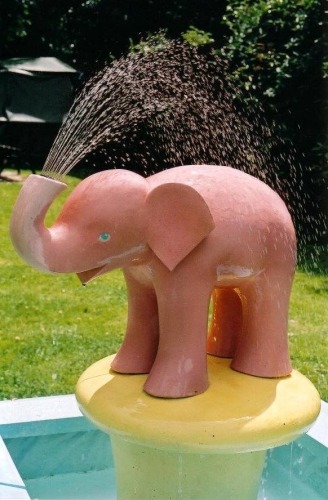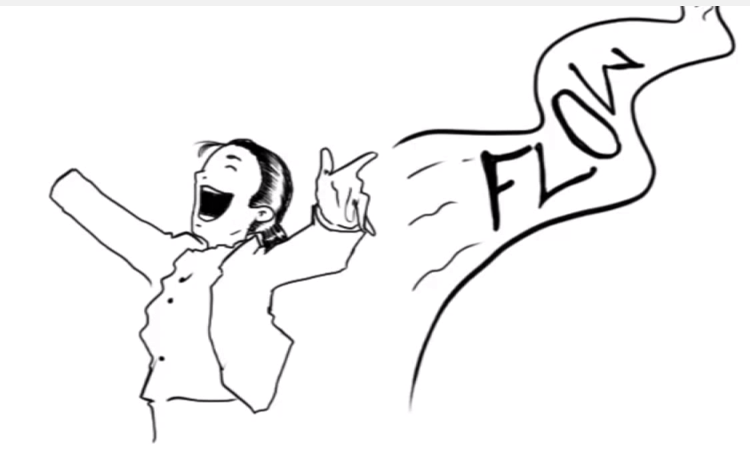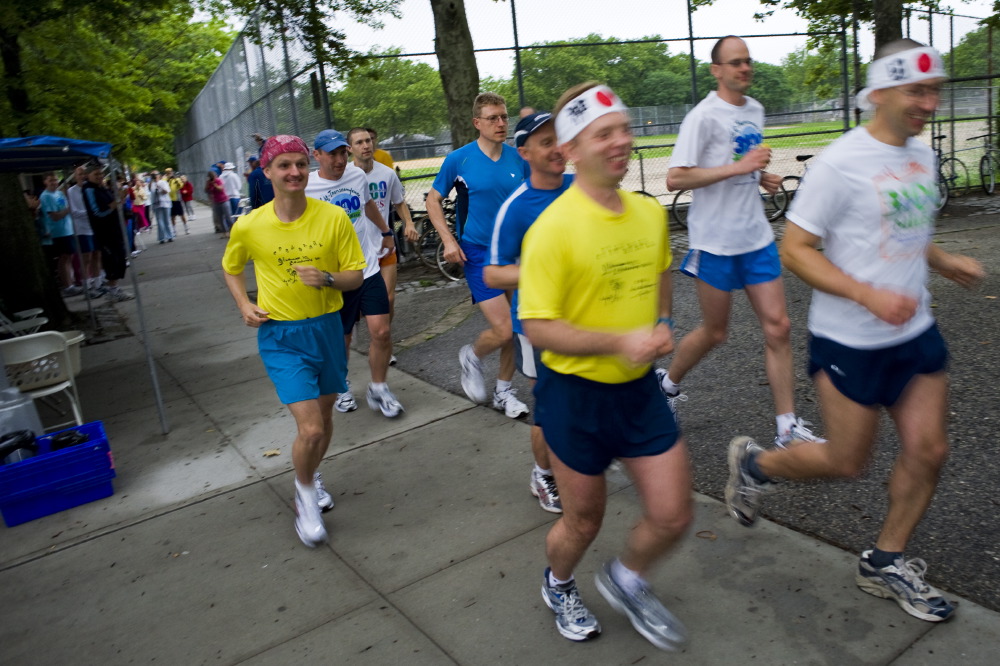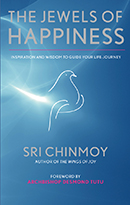Every day there is only
One thing to learn:
How to be honestly happy.

5 ways to stay in the moment
A trick how to have immediate happiness: try to think of a moment in your life when you were truly happy, and relive that memory as vividly as you can. Perhaps that moment was a walk on a full moon night, or a beautiful sunset, or the birth of your child. Whatever it was, chances are you were completely immersed in the present, without thinking of the past or future. Happiness lives only in the present moment. ‘Here and now is the motto of our soul’ spiritual teacher Sri Chinmoy explains. Here are five ways to connect to the precious present.
1. Breathe consciously
Our breath can be a very powerful tool to connect us with the present. If we can become conscious of our breathing, the breath itself will refresh us and give us the awareness of the here and now. Sri Chinmoy offers the following simple exercise for conscious breathing: while walking for five steps breathe in and for five steps breathe out very regularly. After a few minutes you will feel new energy and a sense of ‘presentness’.
2. Observe your surroudings
According to spiritual teacher Jiddhu Krishnamurti we can discover the truth about life and ourselves when we learn the art of observing. To observe means giving something your full attention without passing judgement. Try to tune your eyes and ears to whatever happens in front of you, and do not allow your mind to intervene. You will find the present moment enveloping you and teaching you something valuable about the magic of life. ‘Everything is your teacher,’ Krishnamurti said. ‘A dead leaf, a bird flying by, a scent, a tear, the rich, the poor, people that cry, the smile of a woman, the pompousness of a man.’
3. Meditate
It is our mind that constantly takes us away from the present by flooding us with thoughts about the past or the future. To be sure: the past is dust and the future doesn’t exist. It’s only the present that is real. By virtue of meditation we can make our mind calm and quiet. Then we will see that thoughts are no longer rushing in to distract us from the present. If we can learn how to meditate it will help us to be more conscious of and present in the here and now. As a result we will worry less and be happier and more fulfilled.
4. Sing
Singing is often a spontaneous expression of happiness. In many religions and spiritual paths singing is used as a vehicle to connect to a higher or deeper reality within us, which we can call our soul. Singing is also said to stem from the right side of our brain, the side that houses creativity, spontaneity and intuition. These are all friends of the here and now. So if you don’t want to remain a prisoner of your thinking mind, the sing, smile and be happy.
5. Zone In On Newness
According to our mind everything we see is old. But if we live inside our heart we will feel that life is full of newness and freshness. Children always live in the heart. That’s why to them everything is new, and they are always happy. Oldness leads to the past, but newness connects us to the magic of the present. As Sri Chinmoy says, “In newness there is the hope and the promise that we will be complete. Oldness can never embody the complete reality. It is the ever-transcending newness that will carry the message of completion.” Try to consciously see and experience new things in your life every day. Observe a bird perched on a branch in front of your window, admire the subtle colour of the morning sky, visit a street you never visited before, talk to a stranger on the bus. Newness will keep you alive and kicking in the here and now.

Seven secrets for a long life
‘Who wants to live forever?’ Freddy Mercury sang in the famous Queen song. While immortality is perhaps a bridge too far, living long certainly ranks high on most people’s wish lists. With the scientific, nutritional and spiritual knowledge freely available nowadays, a long life is within easy reach for most of us. Here are seven secrets to help add some years, perhaps even decades, to your life.
Granted, not a real secret anymore, yet regular exercise is one of the prime causes of longevity. ‘Use it or lose it’ is the body’s favourite mantra. Exercise doesn’t have to be strenuous, as long as it’s regular. A twenty minute jog or firm walk every day does the job. If every day is not possible, try to exercise at least three times a week. Science has shown that there is a steep rise in fitness if you go from two to three workouts a week. Swimming, biking, running, tennis or football – anything goes just as long as you’re moving and breaking a sweat. If you happen to be an exercise monster, take care that you take enough rest between workouts, or you destroy more than you build up.
Our lungs can hold an amazing amount of air – five to six liters for the average person – yet we use less than ten percent of that capacity while breathing. When we breathe in deeply and fill our lungs fully with air, we improve our oxygen intake, which in turn stimulates a healthy heart, brain and blood circulation. Deep breathing improves our digestion, since it massages the inner organs around the stomach. It also slows down the heartbeat and lowers or stabilizes blood pressure. Most importantly, a deep breath fills us with a calm, soothing energy and immediately relieves stress. Try to breath in deeply from your belly (which goes out when you breathe in) a few times every day. Your lungs and life will be grateful.
In many old religions the sun was worshipped as a life-giving force, and rightly so. Nowadays we have science to tell us that sunlight provides a steady dose of vitamin D, essential for our overall health and wellbeing. That’s also the reason why people rarely fall sick in summer. Next to sunlight, fresh air also does wonders for our health, which was the reason why sick people were often sent to health resorts by the sea. Besides that, nature has a proven positive effect on our mental health as well, making us calmer, happier and even more creative. Perhaps it is no wonders that farmers are among the longest living people on earth. Spending time outdoors on a regular basis is sure to add a few years to your life.
The Japanese region of Nagano can pride itself on having the longest life-expectancy in the world: 87.2 years for women and 80.9 years for men. It also has one of the highest non-retirement rates, with one in four people over 65 starting a second career. Keeping an active lifestyle after retirement is one of the least known secrets to longevity. We are brought up with the idea that people are old when they retire, but many active seniors are proving this to be unfounded. Work has a stimulating effect on both body and mind, and gives our life a sense of direction. Work keeps us alive in the natural, healthy flow of life. As the Lebanese poet Kahlil Gibran beautifully said, “You work that you may keep pace with the earth and the soul of the earth. For to be idle is to become a stranger unto the seasons, and to step out of life’s procession, that marches in majesty and proud submission towards the infinite.”
The health benefits of meditation have long been proven by scientific research. Meditation not only negates stress and tension, it also lowers blood pressure, stimulates the nervous system and boosts the immune system. Last but not least meditation creates a state of inner joy and optimism – all wonderful ingredients for a long and happy life. Just like with exercise, regularity pays off in meditation. The best results come from daily practice – even five minutes will do wonders. Just sit on a chair with your back straight and concentrate on following your breath, in and out, not allowing thoughts to take your focus away.
Again, watching your diet will come as no surprise in this list. Provide your body with the right fuel to keep it running smooth and healthy for as long as possible. As far as diet goes, what goes in your mouth is just as important as what stays out. Take plenty of fruits and veggies and try to minimize on products like sweets (sugar), refined grains, meat and white flour.
‘The secret of remaining young,’ Sri Chinmoy writes in one of his aphorisms, ‘is to devour beautiful and powerful thoughts.’* He also said, ‘Age is in the mind and not in the heart.’ In other words: you are as old as you feel. Try to put this wisdom to practice and feel that you are eternally young. Imagine the fountain of youth is spurting inside your heart. Think of yourself as only seven years old. If you can remain young in your mind and heart, your body is sure to follow.
* Sri Chinmoy, “77,000 Service-Trees, Part 25”, poem 24,308
Why you should stop waiting for the world around you to change
For Patrick Geryl December 22nd 2012 must have been a sobering day. For years the Belgian amateur astronomer had been warning humanity of the impending disaster taking place on December 21st 2012, when according to an ancient Mayan prophecy the world would come to an end. He had written books, given seminars, launched a website, and figured frequently in the media to state his claims – his appearances increasing as the dreaded day drew near. Yet the 21st of December passed quite unobtrusively, the world shrugging its shoulders about the old prophecy.
When confronted with his faulty predictions, Geryl responded by saying the Mayans had made a calculation mistake. Doomsday would still come, he persisted. Although Geryl was one of its more outspoken advocates, the Mayan End-of-Times apocalypse had a huge following. Thousands of webpages, hundreds of books and countless You Tube video’s were dedicated to the 2012 subject. Trendwatchers even called it a new religion.
Throughout history end-of-times prophecies have always attracted and fascinated people. The idea that the world will end or dramatically change has spellbinding appeal. In one fell stroke a worldwide cataclysm would erase all poverty, wars, corruption and inequality. Humanity’s loss in the proceedings is regarded as collateral damage, and the world is given a chance to make a fresh new beginning. The few surviving humans could build the ideal society, free from the ills that haunt us today. According to the Old Testament story of Noach and the flood, even God once thought it was a good idea – although He changed His mind in the end and promised never to destroy the world again.
It’s like the joke about the two planets meeting in outer space. The first planet, coughing and sneezing, confides in the other, ‘I think I have a bad case of homo sapiens.’ ‘Don’t worry,’ the other planet replies. ‘It’ll blow over by itself.’
Of course this prospect is a very childish way of looking at things. If we dive a little deeper and take a spiritual perspective on things, we will say that destruction is never the way to solve our problems. Greed, corruption, envy and hatred also rear their heads in our own psyche. As the outer world is a reflection or manifestation of the inner world – as spiritual philosophy would have it – the crises we see on the world’s stage are actually enlargements of our own imperfections.
We accuse the banks for causing the financial crisis, but are we oursleves free form greed? The creative way most people fill out their taxes is an answer in the negative. We loathe politicians who say one thing and do another, but are we entirely hypocrisy-proof? We’ll have to admit that we also renege on our promises and are generally inclined to ignore the sage advice we eagerly give to others. We despise war, but in our personal lives we quarrel and fight. So it is as UN Secretary-General U Thant wisely remarked, ‘There is no peace in the world today, because there is no peace in the minds of men.’
We can never change the world. We can only change ourselves. But by becoming a better person we can inspire others to do likewise. Nelson Mandela and Mother Teresa changed themselves and inspired millions. Not to speak of Buddha and Jesus, whose positive ripples spread throughout the ages. So don’t wait for the apocalypse, be the apocalypse! Like Mahatma Gandhi said, ‘Be the change you wish to see in the world.’ Or in the words of Sri Chinmoy, ‘Do not blame the world. Better it. How? By bettering yourself at every moment.’

Gems from the Gospel of Thomas
In 1945 near the Egyptian town of Nag Hammadi a local farmer stumbled upon an urn containing Christian scriptures that were hidden there sixteen centuries ago. The urn contained over fifty sacred texts about Jesus’ teachings, most of them from a Gnostic (mystical) point of view. The scriptures did not belong to the official canon of the New Testament and were probably hidden to prevent them from being burned by the church.
The most complete scripture found at Nag Hammadi was the Gospel of Thomas, a collection of 114 aphorisms or sayings by Jesus regarded by Bible scientists as authentic. Below is an inspiring selection.
“When you know yourselves, then you will be known, and you will understand that you are children of the living Father. But if you do not know yourselves, then you live in poverty, and you are poverty.”
“I have cast fire upon the world, and I’m guarding it until it blazes.”
The disciples said to Jesus, “Tell us what Heaven’s kingdom is like.” He said to them, “It’s like a mustard seed, the smallest of all seeds, but when it falls on prepared soil, it produces a large plant and becomes a shelter for birds of the sky.”
“When you make the two into one, and when you make the inner like the outer and the outer like the inner, and the upper like the lower, and when you make male and female into a single one, so that the male will not be male nor the female be female, when you make eyes in place of an eye, a hand in place of a hand, a foot in place of a foot, an image in place of an image, then you will enter the kingdom.”
Jesus said, “Be passersby.”
“If one is whole, one will be filled with light, but if one is divided, one will be filled with darkness.”
“The Father’s kingdom is like a merchant who had a supply of merchandise and found a pearl. That merchant was prudent; he sold the merchandise and bought the single pearl for himself. So also with you, seek his treasure that is unfailing, that is enduring, where no moth comes to eat and no worm destroys.”
“The Father’s kingdom is like a shepherd who had a hundred sheep. One of them, the largest, went astray. He left the ninety-nine and looked for the one until he found it. After he had toiled, he said to the sheep, ‘I love you more than the ninety-nine.’”
His disciples said to him, “When will the kingdom come?” “It will not come by watching for it. It will not be said, ‘Look, here!’ or ‘Look, there!’ Rather, the Father’s kingdom is spread out upon the earth, but people don’t see it.”

The top 5 of happiness-spoilers
Sometimes the search for happiness feels like chasing rainbows. Yet spiritual masters throughout the centuries have assured us that happiness is our birthright. They also explain why the brief glimpses we occasionally get disappear so quickly. It all has to do with unseen adversaries like negative thoughts and behaviours that rob us of our happiness. Here is the top-5 of happiness spoilers, from bad to worst, including tips how to smash their pride.
5. Complaining
‘Complaining about others is the surest way of wasting one’s precious time,’ spiritual master Sri Chinmoy wrote. Apart from a time-waster it’s also a perfect happiness-spoiler, because complaining focuses on imperfection. When you always zoom in on what is wrong with a situation or a person, you are bound to remain miserable. Instead, try to focus on the positive aspects and consciously overlook the bad parts. You’ll be surprised at how much good energy you will generate within yourself by looking at the bright side of people and things. So don’t complain. ‘Who complains?’ Sri Chinmoy asked rhetorically. His pithy answer: ‘The blind beggar in you.’
4. Expectation

A sure way to ruin the promise of happiness is through expectation. Expectation binds us to an outcome we have imagined. And if our expectations are not met, we are frustrated. As American writer and philosopher Elbert Hubbard said, ‘Our desires always disappoint us; for though we meet with something that gives us satisfaction, yet it never thoroughly answers our expectation.’ So if we want to find happiness, we should try to nip our expectations in the bud. ‘Peace begins when expectation ends,’ Sri Chinmoy said. Try to surrender to the natural flow of life. You’ll find that it has many wonderful and happy surprises in store for you that far transcend your expectations.
3. Comparing
When your boss gives you a promotion, chances are that you are happy. Until you find out that your colleague has made an even higher promotion. Immediately your joy is shattered. Even the most successful businessman, singer, poet, artist or athlete will be frustrated the moment he or she starts comparing him or herself with others, because there will always be someone who is just a little better, a little more successful, a little more famous. Comparison is happiness-poison. When we compare we belittle our own achievements and destroy the joy they initially gave us. If you have to compare, then compare yourself with your own previous achievements, and try to improve. By focusing on bettering yourself you will find true and lasting happiness.
2. Worry
Worry has killed many a happy moment. Although its bite is always painful, worry tries to make us feel that we need it badly, that without it we will be totally lost. In reality nothing is more useless than worrying about the future. Just think about it: does worrying really help? Say, for instance, you are late for an important appointment. Will worrying be able to turn back the clock? On the contrary, your worries will only add to your misery. What you need at that time is some calm and clear thinking: call the person you had the appointment with, apologize for being late and try to be at peace with the situation. You’ll discover that it’s not half as bad as you thought. To quote Jesus: ‘Do not worry about tomorrow, for tomorrow will worry about itself. Each day has enough trouble of its own.’ And if all else fails, remember this simple mantra: don’t worry, be happy!
1. Self-doubt
Ranking first in the top-5 of happiness-spoilers is self-doubt. Few things are as destructive as this fellow. When we doubt others, they don’t lose anything of their capacity – and neither do we. Perhaps we misjudge them by doubting, but their reality and our reality stay intact. But if we doubt ourselves, we are pretty much finished. We won’t be able to accomplish anything. ‘Self-doubt is the very beginning of self-destruction,’ Sri Chinmoy writes. Fortunately there is an antidote, which is called faith. We should try to have faith in ourselves. According to spiritual experts, the best way to cultivate faith is to meditate. If we can silence our mind, we will gradually and spontaneously bring to the forth peace and joy from our heart. When we feel these positive qualities and realities within us, it becomes impossible to doubt ourselves.

Why humility is such a powerful life-tool
When we think of great men, names like Ceasar, Napoleon and Alexander the Great come to mind. They were men of war and conquest. They shaped the history of the world, but paved the way with bloodshed and violence. On the other hand, when we think of good people, we think of Nelson Mandela, Mother Theresa or Mahatma Gandhi. They inspired humanity through their self-sacrifice, love and wisdom.
Great men often have great ego’s. Napoleon had a marshal in his army who was over two metres (6’7”) tall, whereas he himself stood at 1.77 (5’10”). Once he noticed this marshal walking with his shoulders and posture bent, and he asked him why he was slumped over. ‘Your Majesty,’ the marshal replied, ‘I feel uncomfortable being taller than you, since you are the emperor.’ ‘I have no problem with that,’ Napoleon answered. ‘You are seeing it the wrong way. You are taller, but I am greater.’

Good men (and women) are usually humble. When he became president of South-Africa Nelson Mandela could have easily punished his former enemies, who had supported apartheid and committed atrocities against the black population. Instead, he decided to forgive them and formed a tribunal of reconciliation to bring the whites and blacks together. Mother Theresa sacrificed her life to serve the poor, the sick and the downtrodden in Calcutta. Mahatma Gandhi became the ‘father of the Indian nation’ by looking beyond caste and creed. He unified all classes of society into a common purpose: to gain independence from the British. Through their humility these people did not conquer other countries, but something far more significant: the heart of humanity.
Humility is a spiritual quality that is often underestimated. We tend to associate being humble with being humiliated, a word that sounds almost the same but has a vastly different meaning. When we are humiliated our ego suffers a painful blow. But when we are humble we inspire our ego to look beyond its own small world and feel its oneness with the entire world.
Humility also has nothing to do with the feeling of unworthiness. “He who feels unworthy will automatically remain far away from the world of delight,” spiritual teacher Sri Chinmoy writes, whereas humility always comes with the feeling of joy. “True humility is the feeling of oneness,” Sri Chinmoy continues. “Humility means giving joy to others. By making others feel that they are either equally important or more important, we will show our true humility.”
Again, there is also something called false humility. To be sure, insincere or opportunistic flattery, soft-soaping or feeling unworthy are not real humility. How to distinguish between the two? Sri Chinmoy again: “When it is true humility you will get tremendous joy and you will feel that the person to whom you are bowing down is in no way superior to you. You are bowing down only because you see the Supreme* in him. But when it is false humility, there is no joy at all. You do not get joy in your heart, you do not get joy in your mind.”
* Sri Chinmoy used the term ‘Supreme’ to refer to God.
A very effective way to develop humility is to meditate on the heart-centre. Our spiritual heart – located in the centre of our chest – is the home of divine love and the feeling of oneness. When we can concentrate on our spiritual heart for a few minutes every day, we will gradually become aware of the divine qualities of love and oneness. When we feel one with the world around us, we automatically become humble.
Another way to develop humility is to think of something that gives you the feeling of humility. Sri Chinmoy recommends meditating on a tree. “A tree is humble from the root right up to the top. When we identify with a tree, we get humility. When a tree bears fruit, it becomes a perfect servant to feed mankind. When you see how humble the tree is and how it is appreciated by others, this will help you develop your own humility.”
To do this, try to keep your mind calm and quiet and fill it with the image of a huge tree laden with flowers and fruits. Think of the service the tree is so humbly offering: its shade, its sheltering branches, the fragrance of its flowers and its fruits which it is giving away freely.
To leave a lasting impression on the world you can choose between two paths: the way of power or the way of humility. Powerful people may be remembered for their great deeds, but humble people will not only be remembered, but will also be loved and treasured by the whole world.
‘Everything that is beautiful
And fruitful
Grows on our life’s humility-tree.’
-Sri Chinmoy

Why freedom of choice can make us unhappy
“When I choose I lose.” This pithy, zenlike aphorism from my teacher Sri Chinmoy had me raise my eyebrows the first time I read it. Now, sixteen years of meditation practice later, I’m able to appreciate its wisdom so much more. I have given up making choices, and can honestly say to be happier for it.

Instead of going through the anxiety of the decision making process, endlessly weighing pros and cons and often ending up feeling dissatisfied with the outcome, I take a step back and allow life to choose for me. Life’s choices are so much better than my own. I’ve never felt dissatisfied with them.
Abandoning this choosing process is a spiritual practice Sri Chinmoy terms ‘surrender’. The inner result is always happiness, even if the outcome of the choice is not outwardly pleasant or rewarding. “A surrender-life will eventually be crowned with Infinity’s Joy,” Sri Chinmoy writes.
Now science is backing this spiritual insight with evidence. Dan Gilbert, a professor of psychology at Harvard, has discovered that if we are forced to accept a situation that is not of our own choosing, our brain adapts itself to it and makes the situation seem pleasant to us. To illustrate his point Gilbert quoted an ex-convict who spent 37 years in jail and on release said the experience had been ‘glorious’ and he wouldn’t want to have missed it.
To prove his point further Gilbert conducted an experiment where he asked students from his university to take twelve photo’s, select the two best ones and develop them into prints. He then told the students that they could take one of their two prints home, but that the university needed the other one for their archives. To the first group of students he said that they had to make a choice then and there, and select the photograph they wanted to keep for themselves. To the other group he said that they could always swap the pictures later if they were dissatisfied with their choice. He then asked the students to rate their happiness with the picture they chose five days later. It turned out that the students who could not swap their pictures were very happy with their choice, whereas the students who had been offered the possibility to undo their choice were profoundly unhappy.
Gilbert concluded that contrary to what we think, free choice is often a cause of dissatisfaction, whereas absence of choice triggers our brain into a state of happy acceptance. He called this “synthetic happiness”, since it is created by the brain in response to a situation it did not voluntarily choose. “Synthetic happiness is every bit as real and enduring as the happiness you stumble upon when you get exactly what you were aiming for,” Gilbert said.
To me it sounds a lot like the joy of surrender Sri Chinmoy spoke of.

The growing influence of meditation and mindfulness
As the evidence grows to support the efficacy of meditation and mindfulness, more and more articles about these age-old practices are appearing in major media outlets.
For example, in this article the New York Times reports studies verifying the age old wisdom that meditation helps make you more compassionate and sympathetic to others’ needs:
The next time you meditate, know that you’re not just benefiting yourself, you’re also benefiting your neighbors, community members and as-yet-unknown strangers…
Or what about this article in the Huffington Post, outlining step-by-step the myriad benefits of meditation:
Over the past few years, meditation has evolved from an of-the-moment fad to a legitimate health craze, as research has linked the practice to everything from improved cardiovascular health to cognitive benefits. Science has even shown that mindfulness meditation can affect gene expression.
While the modern-day science behind this age-old practice is still developing, plenty of studies suggest that meditation is about way more than blissing out
This article helps explain in simple but adept ways how meditation helps everyone develop a calmer more focused life. What that does in turn is allows us to grow into a more complete person. We lower our stress, take more positive actions in our life choices, and live happier, healthier lives when we take time to deflate the ego and rejuvenate our connection with the source of happiness that resides within each of us.
And finally, in an example of how mindfulness is being increasingly adopted by medical professions, we’ll end with this short video from Center for Mindfulness at the University of Massachusetts Medical School, where we see some attributes of allowing ourselves to let go of the worries and anxieties of life in order to free ourselves from the burdens that society often places upon us.

A positive outlook in psychology
In psychology, what happens if we stop assuming everything is broken about a person and begin to ask what’s giving someone joy and happiness, and how do we grow these aspects? This is the basis behind positive psychology, a new branch of psychology that has been expanding in the last 15 years.
We found this very nice video explaining what positive psychology is and isn’t:
The video talks quite a bit about ‘flow’ – this is the idea that when we engage ourselves so deeply into an activity that gives us joy in some measure that we begin to lose the self and become immersed in the action without thought to the outcome’s success or failure but rather in the action of the task. It is the loss of self that offers the greatest reward. While this isn’t a cure all for everyone’s problems it certainly does illuminate a new path to understanding the effects of a positive outlook on life and a gives us a viewpoint perhaps not thought of before.

5 Tips for Keeping a Lasting Running Practice
Running is the sport that requires minimum preparations for maximum results. All you really need is a pair of running shoes (well okay, some proper running clothes as well) and you’re good to go, anytime, anyplace. Perhaps that down-to-earth simplicity is what has made running arguably the most popular sport on the market today. Well that, plus the unmistakable fact that running comes with a host of benefits, ranging from physical fitness to overall well-being and happiness. Research has shown that people who uphold a regular running practice tend to be more cheerful and optimistic and also more patient than those who don’t run. Here’s five tips on how to keep churning out the miles – and the smiles – on a regular basis:
1. Choose a goal
Running becomes more enjoyable and exciting when you work towards reaching a goal. The goal can be as simple as being able to run non-stop for half an hour (for complete beginners), or as far reaching as finishing a marathon (for advanced only). And of course anything in between. Once you have a goal you’re really keen to reach, your motivation to tie on those running shoes several times a week gets a powerful boost, because each of your runs becomes a significant building block to reach that goal. One of the greatest feelings in running is the sense of making progress and becoming fitter. Having a goal you almost forces you to make progress and improve your fitness. In this way running becomes much more satisfying than when it’s just the standard lap or two around the park.
2. Don’t always do the same thing!
People sometimes complain of running being monotonous and boring. Granted, if you always do the same loop at the same time of day, at the same speed, that really is boring! Instead, try something new once in a while. Variety is one of the most important ingredients in keeping a healthy and enjoyable running practice. You can play around with the distance, the speed, the course, the time of day and the company you keep while running, so that each run is its own unique combination of all these factors. Some short repetitions on the track, a long run through a part of town you’ve never seen before or a pleasant, enjoyable afternoon jog with a bunch of friends – each run can and should be different to enjoy your running practice to the max and make it last.
3. Shift gears
Have you ever seen a little child jog? Hmm, probably not. When children run, they always go full blast. Kids know that nothing is as fun and exhilarating as running fast. Sure, you get tired, but you also feel great! To connect to the raw, original joy of running try to get your breath wheezing, your heart hammering and your adrenaline pumping from time to time. Incorporate some fast laps on the track or some fartlek (literally ‘speed-play’, a workout where you run fast for certain spontaneously chosen sections of your running course) into your training runs each week. You may be a bit sore and stiff in the beginning, but when you shift gears once in a while your running acquires a new level of enjoyment. Oh, and you’ll also boost your fitness in an amazing way.
4. Join a club or community
‘Pain shared is minimized. Joy shared is maximized,’ spiritual teacher Sri Chinmoy used to say. This piece of wisdom definitely applies to running. Going for a jog or a run with others is not only a great social activity, but also a physical stimulus. The energy of a group carries you through the miles and you’ll find yourself less troubled by fatigue and monotony. And working towards a goal together – like finishing a 10K race – gives you much more joy and motivation than fighting your battles all alone. So whether it’s a track workout or a Sunday long run, try to find some birds of a feather to flock together. Join a running club in your city, or find a running community. And if not available, create your own! Hang up a note in your local supermarket or running store and make some new friends.
5. Dress to the nines
Would you wear an old pair of jeans to the prom? By the same rationel, neither should you run in worn slacks, a faded cotton shirt and tennis shoes. Of course you’re not running to make a fashion statement, but the right clothes can help to give your motivation that extra little push. When you’re decked out in the right running outfit, you’ll feel more eager to go and burn some rubber. Your run will feel so much more smooth in good quality running gear. Proper running shoes not only feel and look better when you run, they also help to prevent injuries. So invest in some quality running material. It may cost a few bob, but it’s worth the effort.






























